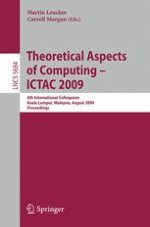ThisvolumecontainsthepaperspresentedatICTAC2009:the6thInternational Colloquium on Theoretical Aspects of Computing held August 18–20, 2009 in Kuala Lumpur, Malaysia, hosted by Universiti Kebangsaan Malaysia. The ICTAC series was founded by the International Institute for Software Technology of the United Nations University (UNU-IIST). It brings together practitionersandresearchersfromacademia,industryandgovernmenttopresent results and to exchange ideas and experience addressing challenges in both t- oretical aspects of computing and in the exploitation of theory through me- ods and tools for system development. The series also promotes cooperation in research and education between participants and their institutions, from dev- oping and industrial countries, in accordance with the mandate of the United Nations University. The previous ICTAC colloquia were held in Guiyang, China (2004, LNCS 3407), Hanoi, Vietnam (2005, LNCS 3722), Tunis, Tunisia (2006, LNCS 4281), Macao SAR, China (2007, LNCS 4711), and Istanbul, Turkey (2008, LNCS 5160). This year, 81 submissions were received, distributed over 70 full research papers and 11 tool papers. Each submission was reviewed by at least three P- gram Committee members. We thank the members of the Program Committee and the other specialist referees for the e?ort and skill that they invested in the review and selection process, which was managed using EasyChair. The C- mittee decided to accept 20 papers: 17 full research papers and 3 tool papers.
